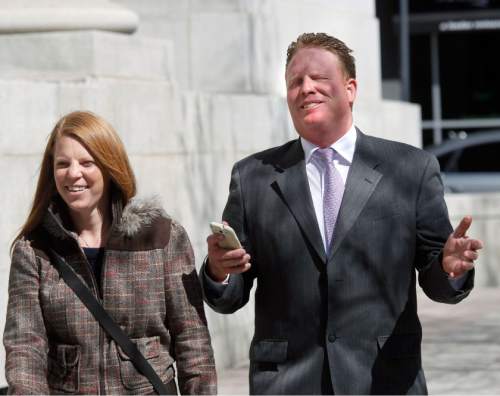This is an archived article that was published on sltrib.com in 2015, and information in the article may be outdated. It is provided only for personal research purposes and may not be reprinted.
A federal judge's ruling in a Nevada civil case may finally give St. George businessman and one-time Mark Shurtleff associate Jeremy Johnson his day in court, more than four years after the Federal Trade Commission shut down his online marketing company for alleged deceptive businesses practices.
The FTC filed a civil lawsuit against Johnson and his company in 2010, claiming I Works consumers were intentionally misled to buy instructional information on make-money schemes, stay-healthy programs and obtaining government and private grants for personal expenses.
In a split ruling issued Monday, U.S. District Judge Miranda Du concluded that some I Works Web pages were indeed misleading. However, said the government only provided a representative sample of those pages and it was unclear whether the "examples are representative of the grant websites as a whole."
"The court," Du wrote, "cannot adopt the FTC's approach of using selected examples of claims picked from across the entire universe of the FTC's exhibits, seemingly without methodology, and draw conclusions as to everyone of defendants' sites."
Du's decision to grant in part and deny in part the FTC's request for summary judgment, will send the case to trial, Karra Porter, the Salt Lake City attorney representing I Works, some of its affiliates and Johnson's wife and family, told The Salt Lake Tribune on Wednesday.
"Overall we are thrilled with this ruling," said Porter, who does not represent Johnson himself in the case. "We are going to trial on the vast majority of the issues and claims."
Porter said she intends to ask the judge to set a trial date at the earliest possible date.
FTC spokesman Frank Dorman was unfamiliar with Du's ruling, but said he could not comment on any ongoing litigation.
Court papers say government attorneys provided Du with more than 100 examples of I Works websites, which they claimed persuaded consumers to give the company credit- or debit-card numbers for a minimal handling charge, usually $1.99, to get the promised information. Later, consumers were then charged monthly fees of $59.95, and some faced a one-time fee of $189 — information the lawsuit contends was not easily understood by consumers.
Porter contends the practice is commonly used by Internet merchants in various industries. Du's finding with regard to the Web page examples is significant because the pages represent only a fraction of the I Works pages, which were constantly changing in order to drive traffic and sales — just as other companies do.
Du also concluded that the court was not able to determine whether every I Works site was "likely to mislead a consumer [who was] acting reasonably."
Among the issues left unresolved by the judge's ruling is whether I Works is responsible for marketing decisions and actions of its numerous affiliate companies and whether the earning potential claims on a Google "AdWords" site I Works used were also misleading.
The judge's order gives FTC and I Works attorneys 15 days to discuss how to proceed on the outstanding case issue and provide her with a status report.
Johnson and four I Works employees also face a separate criminal indictment in Utah on 86 charges related to bank accounts opened to process consumer payments. A five-week jury trial is set to begin Sept. 14. Federal prosecutors have offered plea agreements to all of the defendants, although those are set to expire June 30.
Johnson has also played a role in the criminal investigations of former Utah Attorneys General Mark Shurtleff and John Swallow for an alleged bribery and corruption scandal inside the state's top law enforcement agency.
In 2013, Johnson went public with allegations about Swallow, Shurtleff's former chief deputy, including a plot to bribe U.S. Senate Majority Leader Harry Reid to shut down the investigation of I Works by the FTC.



